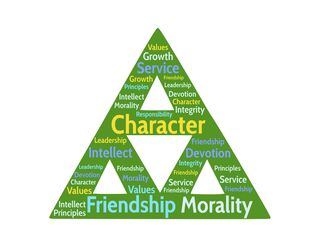Education
Investments in Community May Decrease Need for Police
Character education and service-learning efforts are promising interventions.
Posted June 30, 2020

If it's true that adversity builds character, we are all going to come out of 2020 as better people. First, a pandemic delivered a stress test to our public health system and our economy. Then the horrible death of George Floyd and protests over the abuse of blacks and other minorities rocked our communities.
Part of the conversation following Floyd’s death under the knee of a Minnesota policeman has been about defunding the police. Critics claim that defunding will worsen crime and may cause decreases in the number of black police officers resulting in police departments with higher ratios of whites to blacks. But those who support the effort assert that, while defunding is an imperfect term, decreasing funding for police efforts and instead giving that money to other community efforts will make a more sustained difference in preventing crime.
What efforts can communities pay for that may help lessen crime in the long run? For one, character education programs in public schools. The U.S. Department of Education instituted a pilot character education program via the Improving America's Schools Act of 1994. State education agencies received grants, and the agencies supported schools that creatively integrated character development into their curriculums. Educators instituted initiatives to help promote young folks in becoming:
- Critical thinkers
- Diligent and capable performers
- Ethical thinkers
- Respectful and responsible moral agents
- Self-disciplined persons
- Democratic persons
- Spiritual persons engaged in crafting a life of noble purpose
Character education in the schools, made popular by Dr. Thomas Lickona of SUNY Cortland, encourages teachers to include moral lessons in their instruction. Schools require teachers to instruct their students using standard curriculum while also helping teachers to promote soft skills such as kindness, respect, and empathy. If an entire cohort learns these skills, the outcomes are promising. For instance, if a school focuses on gratitude for a week, then the lessons are imparted through multiple channels. English teachers craft writing prompts using the word gratitude. Principals make morning announcements that remind the students to focus on things for which they are grateful. Gym teachers tease their classes by saying, “Aren’t you all grateful for these push-ups?”
Character education may help quell youth violence and enable young folks to grow into civic-minded adults. Programs may improve individuals’ performance and moral character. The character education curriculum established at SUNY Cortland claims youth taking part in exercises to strengthen character will “enable them to build a positive and productive future for themselves and a better world for us all.”
Researchers find that youth development programs work because prevention of problem behavior is better than treating bad behavior when it occurs. Structured curriculums that present ways to strengthen character and foster youth development can reduce youth problems but need further study. States and localities should fund longitudinal studies of character development programs instead of just putting money into policing activities.
Communities can also reroute funding meant for policing to after-school programs. Researchers have found that the first year of high school is a risky time for youth. Young high schoolers, with their frontal brain lobes not yet fully developed, start to act out more regularly. If communities can finance after-school programs for middle schoolers, they may be able to change the brains of young folks so that the mistakes they make as they are growing are not ones that would get them police attention.
Communities can also funnel money into programs that help pre-teens express feelings. For example, writing programs like those at 826DC aid students in communicating the angst commonly felt by pre-adolescents. At 826DC, local students participate in programs such as the Young Authors’ Book Project and the After School Writing Lab. Volunteers and staff encourage youth as they creatively get their feelings out, writing poetry or illustrating or writing short books.
And finally, schools and communities need to support service-learning programs. Many public and private schools require community service but routine volunteer programs are not as rigorous as service-learning programs. True service-learning requires not only volunteering but also reflection on difficult issues, such as why certain populations face poverty. A community service program would have students pick up trash. A similar service-learning program would have students investigate county recycling, learn about the mechanics of recycling, and then pick up and recycle trash. Students who participate in service-learning programs become more caring and connected to their communities. Schools need service-learning advocates, and counties should fund service-learning directors.
Efforts such as character education, after-school programs, and service-learning are studied by researchers with mixed results. It is difficult to tease out whether such programs do prevent youth violence or result in kinder, gentler adolescents. However, school jurisdictions should prioritize continuing these programs with special attention to conducting longitudinal studies. Part of the reason the research may not show cause and effect is that the outcomes are assessed too early, rather than 10 years after the intervention.
Character education helps make for safer schools and may help prevent bullying before it starts, may prevent violence, and can help youth develop characteristics such as self-discipline. These programs, along with after-school and service-learning programs, need community funding and attention. As jurisdictions re-structure their budgets to decrease money spent on policing, they should fund programs that focus on youth development. Positive results won’t be seen overnight, but instead over a period of years, since character development is a long-term process.




